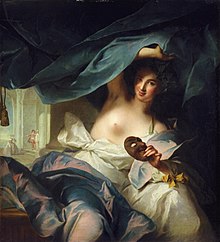Talia
Contenido keyboard_arrow_down
Talía (in ancient Greek Θάλεια, "flourishing", from the verb θάλλεω, thálleô, "to flourish") was one of the two muses of the theater, the one who inspired comedy, and was also the muse of bucolic or pastoral poetry. She was a divinity of a rural character and was generally represented as a smiling young woman, with a lively appearance and a mocking look, carrying in her hands a comical mask as her main attribute and, sometimes, a shepherd's crook, an ivy crown on the head as a symbol of immortality and boots or sandals. Talia was the daughter of Zeus and Mnemosyne. She was a mother with Apollo of the Corybantes.
Contenido relacionado
Leovigildo
Boxing
37th century BC c.
Más resultados...
